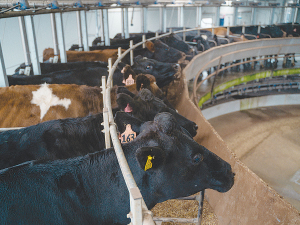Ergot Toxins: Hidden summer threat to cow health
Summer can be a tricky period on farm. Cows approach the summer period milking well, but the summer heat causes rapid changes in pasture.
 A well transitioned cow will normally produce more milk, have fewer disease issues, and a better reproductive outcome.
A well transitioned cow will normally produce more milk, have fewer disease issues, and a better reproductive outcome.
Making key decisions around feeding and supplementation for springer cows can have a bigger impact on a dairy farm’s profitability than any other single set of management decisions made throughout the rest of the season.
Both the period prior to calving and the period after calving are equally important to ensure a cow will produce at her potential. A well transitioned cow will normally produce more milk, have fewer disease issues, and a better reproductive outcome, than cows that don’t receive as much attention around this time.
A cow that is not transitioned correctly leading up to calving can suffer from clinical or subclinical metabolic disease leading to a host of issues that can last through next lactation.
This can be caused by a true calcium deficiency, or the limited ability to mobilise sufficient calcium, this can be further complicated by ketosis, fatty liver disease, or even a combination of these problems.
For any cow, this is a period of vast metabolic change. Their hormone levels are kicking into gear as the body gets ready to mobilise many of the key minerals required for calving and lactation, as well as preparing the body to mobilise the vast amounts of energy required. Transition is the single highest stress period a cow will experience each year.
A good transition diet will ensure that the transition cow receives at least minimum levels of calcium, phosphorous, and sodium, while magnesium and trace elements are also being well maintained. The pre-calving diet should also be as low in potassium as possible so as not to limit calcium uptake.
Cows will also most likely be low in at least some of the trace elements during this period, and unless addressed, a deficiency can negatively affect the capacity of the liver to metabolise the necessary energy levels required through calving and early lactation. Correct supplementation can be critically important at this time, especially if body storage levels of these required minerals are already low.
The simple process of correctly transitioning a cow throughout this period will ensure good blood calcium levels are maintained and a high rate of calcium mobilisation can be achieved throughout lactation. Research has consistently shown that cows with high blood levels of calcium during early lactation also have a higher neutrophil function (increased immunity). Over the years there has been a large body of research linking blood calcium levels with metritis, RFM’s, displaced abomasum’s and issues with poor reproductive performance, clearly showing the importance of achieving adequate blood calcium levels (>8,59 mg/dl) in dairy cows at key times.
Agvance Nutrition in association with your vet have the software tools to accurately calculate the ideal transition diets for your cows. We can build blends for both the pre-calving and post-calving periods, and we also offer free advice around correct feeding and management throughout this period.
Chris Balemi is Managing Director of Agvance Nutrition Limited
Could a breakthrough in fermentation create a new multi-million-dollar export market for shiitake mushroom extracts into China?
Meadow Fresh has created the world's first fantasy sports league powered by real cows.
This year, 'Foodie February' sees potatoes take the spotlight as one of New Zealand's most powerful and versatile food heroes.
A multi-cultural team is helping to establish one of New Zealand's largest plantings of premium eating grapes - while learning each other's languages and cultures along the way.
The World Wide Sires National All Day Breeds Best Youth Camp Best All Rounder plaudit has become family affair, with 2026 Paramount Cup winner Holly Williams following in her sister Zara's footsteps.
DairyNZ is giving New Zealand farmers a unique opportunity to gain hands-on governance and leadership experience within the dairy sector.
OPINION: Fonterra may be on the verge of selling its consumer business in New Zealand, but the co-operative is not…
OPINION: What does the birth rate in China have to do with stock trading? Just ask a2 Milk Company.